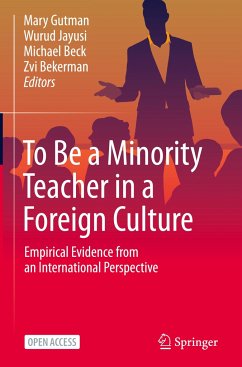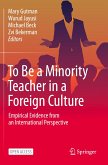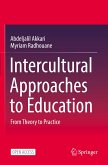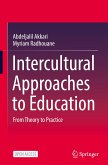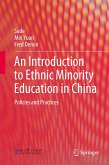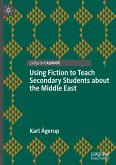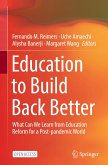To Be a Minority Teacher in a Foreign Culture
Empirical Evidence from an International Perspective
Herausgegeben:Gutman, Mary; Jayusi, Wurud; Beck, Michael; Bekerman, Zvi
To Be a Minority Teacher in a Foreign Culture
Empirical Evidence from an International Perspective
Herausgegeben:Gutman, Mary; Jayusi, Wurud; Beck, Michael; Bekerman, Zvi
- Gebundenes Buch
- Merkliste
- Auf die Merkliste
- Bewerten Bewerten
- Teilen
- Produkt teilen
- Produkterinnerung
- Produkterinnerung
This open access book offers in depth knowledge on the challenges and opportunities offered by the inclusion of minority teachers in mainstream educational settings from an international perspective. It aims to be a unique and important contribution for scholars, policy-makers, and practitioners considering the complexities brought about by global trends into national/local educational systems and settings. It will also serve to guide future research, policy, and practice in this important field of inquiry.
The work will contribute answers to questions such as: How do immigrant/minority…mehr
Andere Kunden interessierten sich auch für
![To Be a Minority Teacher in a Foreign Culture To Be a Minority Teacher in a Foreign Culture]() To Be a Minority Teacher in a Foreign Culture30,99 €
To Be a Minority Teacher in a Foreign Culture30,99 €![Intercultural Approaches to Education Intercultural Approaches to Education]() Abdeljalil AkkariIntercultural Approaches to Education30,99 €
Abdeljalil AkkariIntercultural Approaches to Education30,99 €![Intercultural Approaches to Education Intercultural Approaches to Education]() Abdeljalil AkkariIntercultural Approaches to Education38,99 €
Abdeljalil AkkariIntercultural Approaches to Education38,99 €![An Introduction to Ethnic Minority Education in China An Introduction to Ethnic Minority Education in China]() SudeAn Introduction to Ethnic Minority Education in China104,99 €
SudeAn Introduction to Ethnic Minority Education in China104,99 €![Culture Wars in American Education Culture Wars in American Education]() Michael R. OlneckCulture Wars in American Education195,99 €
Michael R. OlneckCulture Wars in American Education195,99 €![Using Fiction to Teach Secondary Students about the Middle East Using Fiction to Teach Secondary Students about the Middle East]() Karl ÅgerupUsing Fiction to Teach Secondary Students about the Middle East30,99 €
Karl ÅgerupUsing Fiction to Teach Secondary Students about the Middle East30,99 €![Education to Build Back Better Education to Build Back Better]() Education to Build Back Better38,99 €
Education to Build Back Better38,99 €-
-
-
This open access book offers in depth knowledge on the challenges and opportunities offered by the inclusion of minority teachers in mainstream educational settings from an international perspective. It aims to be a unique and important contribution for scholars, policy-makers, and practitioners considering the complexities brought about by global trends into national/local educational systems and settings. It will also serve to guide future research, policy, and practice in this important field of inquiry.
The work will contribute answers to questions such as: How do immigrant/minority teachers experience their work in mainstream educational settings?; How do mainstream shareholders experience the inclusion of immigrant/minority teachers in mainstream educational settings?; What is the effect of the successful (and/or unsuccessful) integration of minority teachers and teacher educators into mainstream education settings?.
The work will contribute answers to questions such as: How do immigrant/minority teachers experience their work in mainstream educational settings?; How do mainstream shareholders experience the inclusion of immigrant/minority teachers in mainstream educational settings?; What is the effect of the successful (and/or unsuccessful) integration of minority teachers and teacher educators into mainstream education settings?.
Produktdetails
- Produktdetails
- Verlag: Schweizerischer Nationalfonds zur Förderung der wissenschaftlichen Forschung / Springer / Springer I
- Artikelnr. des Verlages: 978-3-031-25583-0
- 1st ed. 2023
- Seitenzahl: 520
- Erscheinungstermin: 26. April 2023
- Englisch
- Abmessung: 241mm x 160mm x 32mm
- Gewicht: 1034g
- ISBN-13: 9783031255830
- ISBN-10: 3031255836
- Artikelnr.: 66990657
- Herstellerkennzeichnung Die Herstellerinformationen sind derzeit nicht verfügbar.
- Verlag: Schweizerischer Nationalfonds zur Förderung der wissenschaftlichen Forschung / Springer / Springer I
- Artikelnr. des Verlages: 978-3-031-25583-0
- 1st ed. 2023
- Seitenzahl: 520
- Erscheinungstermin: 26. April 2023
- Englisch
- Abmessung: 241mm x 160mm x 32mm
- Gewicht: 1034g
- ISBN-13: 9783031255830
- ISBN-10: 3031255836
- Artikelnr.: 66990657
- Herstellerkennzeichnung Die Herstellerinformationen sind derzeit nicht verfügbar.
Mary Gutman is researcher and teacher educator at the department of Early Childhood Education and the program of Educational Policy and Management. She serves as a head of the research authority at Efrata College of Education in Jerusalem, Israel. Gutman is a graduate of the excellence programs of P.Hd studies (President's Scholarship Program, Bar Ilan University) and the Postdoctoral Program (Mofet Institute). Her research interests refer to multiculturalism in teaching and teacher education, educational policy and management, minority-majority relationships and immigration in educational contexts. In recent years she has published dozens of articles in leading international journals and won a number of competitive research scholarships and grants. Wurud Jayusi is a Head of the Arab Academic Institute and a former director of the Center for the Advancement of Shared Society (Beit Berl College, Israel). Her main research interests focus on peaceeducation, multicultural and multiethnic education, and minority-majority relations in the education system, and cross-cultural teaching. Jayusi has published multiple papers in leading academic journals and presented her studies in international conferences. Michael Beck is a lecturer and director of the Institute "Education and Society" at the University of St. Gallen for Teacher Training, Switzerland. He holds a PhD in Educational Sociology from the University of Bern, Switzerland. His main interest is diversity with a focus on migration and socio-economic status in the areas of social mobility, educational inequality, political participation and teacher training. He is a member of the "Education and Migration" working group at Swiss universities. Zvi Bekerman teaches anthropology of education at the School of Education, Hebrew University of Jerusalem, and is a faculty member at the Mandel Leadership Institute in Jerusalem. He is also an Associate Fellow at The Harry S. Truman Research Institute for The Advancement of Peace. His main interests are in the study of cultural, ethnic and national identity, including identity processes and negotiation during intercultural encounters and in formal/informal learning contexts. In addition to publishing multiple papers in a variety of academic journals, Bekerman is the founding editor of the 'Diaspora, Indigenous, and Minority Education' academic journal.
Part 1: Immigrant and immigrant-origin teachers.- 1. Immigrant teachers' perceptions toward multilingualism at school: potentials, limitations and implications.- 2. Israel: Ethiopian-origin teachers in their first year of work.- 3. The Netherlands: Comparative looks on Chines and Polish immigrant-background teachers.- 4. Israel: Comparative study of Ethiopian and Russian origin teachers in Israeli schools.- 5. Switzerland: Diversity in the classroom, uniformity in the faculty.- 6. Germany: Inclusive school development by immigrant teachers.- 7. USA: Transitional international students from China as minority teachers.- Part 2: Trajectories and identities of migrant teacher educators.- 8. Indian-Asian migrant teacher educator in USA: navigating the foreignness American curriculum.- 9. From Korea to USA: a self- study on professional trajectory of minority EFL teacher educator.- 10. Understanding cultural influences on minority teacher educators' pedagogical choices, agency and identity.- 11. USA: being foreign teacher educator of color in "white" university.- 12. The growth of minority teacher educator: supervision of pre-service teachers' field experiences.- Part 3: Ethnic minority teachers as unrepresented groups.- 13. Turkey: Kurdish Teachers in Turkey within the context of history education.- 14. South Africa: Desegregated teaching, democratic citizenship education and integrating of ethnic minority teachers.- 15. South Africa: Critical discourse analyses on an under-represented ethnic minority teachers in higher education.- 16. Austria: An analysis of underrepresentation and stereotyped perceptions toward ethnic minority English teachers of color.- 17. Black-British born teacher: theoretical look on navigating oppressive white cultural attitudes in school settings.- Part 4: Ethnic minority teachers as culture mediators.- 18. New Zealand: Maory teachers as an ethnic minority in English-medium schools.- 19. China: Minority teachers as a change agent in a changing educational world.- 20. Germany: Networks of ethnic minority teachers and their role in developing multicultural schools- the case study.- 21. Finnish and Swedish schools: Muslim teachers as cultural brokers.- 22. Israel: Palestinian-Israeli teachers' identity as a culture mediator and their motives to teach in Jewish schools.- 23. A critical auto-ethnography of a Latina teacher in USA: Ethnic, cultural and academic teacher identity negotiations and the intersections between them.
Part 1: Immigrant and immigrant-origin teachers.- 1. Immigrant teachers' perceptions toward multilingualism at school: potentials, limitations and implications.- 2. Israel: Ethiopian-origin teachers in their first year of work.- 3. The Netherlands: Comparative looks on Chines and Polish immigrant-background teachers.- 4. Israel: Comparative study of Ethiopian and Russian origin teachers in Israeli schools.- 5. Switzerland: Diversity in the classroom, uniformity in the faculty.- 6. Germany: Inclusive school development by immigrant teachers.- 7. USA: Transitional international students from China as minority teachers.- Part 2: Trajectories and identities of migrant teacher educators.- 8. Indian-Asian migrant teacher educator in USA: navigating the foreignness American curriculum.- 9. From Korea to USA: a self- study on professional trajectory of minority EFL teacher educator.- 10. Understanding cultural influences on minority teacher educators' pedagogical choices, agency and identity.- 11. USA: being foreign teacher educator of color in "white" university.- 12. The growth of minority teacher educator: supervision of pre-service teachers' field experiences.- Part 3: Ethnic minority teachers as unrepresented groups.- 13. Turkey: Kurdish Teachers in Turkey within the context of history education.- 14. South Africa: Desegregated teaching, democratic citizenship education and integrating of ethnic minority teachers.- 15. South Africa: Critical discourse analyses on an under-represented ethnic minority teachers in higher education.- 16. Austria: An analysis of underrepresentation and stereotyped perceptions toward ethnic minority English teachers of color.- 17. Black-British born teacher: theoretical look on navigating oppressive white cultural attitudes in school settings.- Part 4: Ethnic minority teachers as culture mediators.- 18. New Zealand: Maory teachers as an ethnic minority in English-medium schools.- 19. China: Minority teachers as a change agent in a changing educational world.- 20. Germany: Networks of ethnic minority teachers and their role in developing multicultural schools- the case study.- 21. Finnish and Swedish schools: Muslim teachers as cultural brokers.- 22. Israel: Palestinian-Israeli teachers' identity as a culture mediator and their motives to teach in Jewish schools.- 23. A critical auto-ethnography of a Latina teacher in USA: Ethnic, cultural and academic teacher identity negotiations and the intersections between them.

